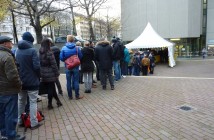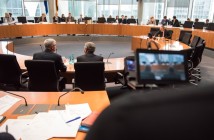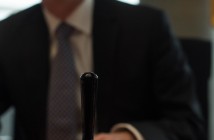Maik E. again sits in the hall, this time he leaves shortly before the hearings begin after being approached by the police. It remains unclear why. The day before he had given the middle finger to the camera, which lead to a headline in Bild newspaper. In addition it still raises the question of whether Maik E. is not also coming under consideration as a witness. According to the police E. went voluntarily.
Around 9:40 the defendants enter the hall. Already at 9:45 the judges enter the room and the Presiding Judge Götzl begins with by taking attendance. The trail begins again with a discussion between Götzl and attorney Heer, one of the defense lawyers of Zschäpe, over who gets to have the floor. Attorney Heer has a question about the attendance. They agree upon, that Heer has still been granted the floor for the outstanding motion over the appointments of the court. The state prosecutor gives her statement. The complaints regarding the appointments of the court are unfounded. It was all run legally, the court was occupied according to regulations. The state prosecutor claims the motion of attorney Klemke, defense lawyer of Wohlleben, reveals a “crude” conception of legality. Co-plaintiffs and defense have no further commentary.
Götzl claims that until a decision is made about the appointments of the court, the main trial will continue. Attorney Stahl, lawyer of Zschäpe contradicts the continuation of the trail, joining in with the defense representatives of Wholleben. The court retires to deliberate. At 10:25 the negotiation continues. Götzl announces the trial will continue. After, attorney Stahl seeks to be given the floor again. Again, he asks how the division of speaking in this trial will be handled. Götzl sees no difference here than in other criminal proceedings. He grants attorney Schneiders the floor for their previously announced motion to suspend the trail and stay the proceedings against Wohlleben.
Schneiders then reads the motion for a suspension of the trial due to the alleged incompleteness of the files. With it they also mention files of the alleged intelligence officers “Mehmet” and “Mevlüt Kar” and quote a Spiegel article from 2011, before the discovery of the NSU. The latest motion here from Schneiders gets, rather, at the character of political clarification and it considers many registered right wing conspiracy theories.
It continues further with a request for the termination of the trial against Wohlleben. Schneiders argues that an irresolvable hindrance to the proceedings exists and a fair trial is no longer possible. This leads them to give two reasons: first, an alleged “media prejudice” and second, other “intelligence involvements” in the NSU.
The accreditation process has shown that attempts were made from outside influences on the independence of justice. It came furthermore to stigmatization and rush judgment on their clients. Already since November 2011 public opinion had turned against the accused and a “parallel trial” was held by the media.
In addition, there was also influence exercised and prejudices given through the politics.
For example through Barbara John the Ombudswoman for the survivors of the victims of the NSU, who has spoken of the connection of the NSU murders to racist murders.
In the process Attorney Schneiders provides the compensatory damages paid to the survivors and the victims commemoration—such as memorial stones for the victims, renaming streets after victims of the NSU, and the central memorial—as connections to the “prejudice” that comes at the expense of their defendant Wohlleben. So far, the Senate show themselves as “steadfast,” but she asks: “can this Senate sustain this over the long duration of proceedings.” The actual entanglements and mistakes of the authorities are now offered by attorney Schneiders, who beginning in the 2000s was herself a member of the NPD K Jena, attempts to white-wash her clients. Schneiders does not cite, for example, the documents of the investigation committee in which information would have been found about some confidential informants within the environment of the NSU, but rather an [incorrect]Bild article as well as the right wing conspiracy theory magazine Compact.
In the subsequent statements co-plaintiff representative attorney Bliwier called the motions “hot air” and “show.” Schneiders used the main trial for a political statement. He indicates furthermore hereon, that the accused Wohlleben at the last day of the trial provided a motion on the grounds of bias against the presiding judge, that today she calls “steadfast.”
Following this again is the familiar war of words between Presiding Judge Götzl and attorney Heer over who has the floor, this time over whether Heer himself or co-plaintiff representative Lunnebach receives the floor. This leads to laughter and heckling in the hall. Heer’s colleague attorney Stahl: “I request a recess, it is not acceptable that there is laughter here, one can’t lead negotiations.” It must be regulated who is given the floor. Afterwards Götzl does not fulfill the motion, and Stahl briefly leaves the room. Götzl asks the representative of the state prosecution for an opinion. They describe the behavior of attorney Heer as “unseemly,” laughing is only a reflex and that the presiding judge shall grant the floor. This is followed by a recess on the topic. At 11:35 am Götzl announces the senate’s decision on the motion and that attorney Heer will not be granted the floor is confirmed. Attorney Sturm, a colleague of Heer, makes a motion for a recess of 45 minutes to discuss the next steps with her client. Götzl asks if it is concerning the motion of bias. Attorney Sturm does not initially confirm this, but it is implied, and again a recess is requested.
This is followed by a mid-day pause until 1:30pm.
With a brief discussion about whether the announced application of Sturm, Stahl and Heer must now be placed, the proceedings begin again. However, since it is not an urgent motion to be handled, like the motion for bias, Götzl continues, initially under protest from Heer, with the statements of the motions of Schneiders. He takes several co-plaintiff’s representative’s and the state prosecution’s positions. State prosecutor Diemer determines that media prejudice according to case law is not to be recognized as a trial hindrance. In terms of content, Diemer positioned himself already for the motion for termination, namely in the press conference at the start of the trial. The investigation of the state prosecutors has “provided no evidence that security forces and secret services were involved with the crimes.”
Co-plaintiff representative Scharmer called the motion to “discontinue a trial of nine counts of racially motivated murder due to media publications,” absurd. Co-plaintiff representative Pinar called the motions indeed unfounded, but also said “we know that there are these governmental entanglements, that records are incomplete and witness‘ have been blocked. But we believe that clarification is in the interest of this court.”
Klemke criticizes the co-plaintiff representative Bliwier, of assuming the defense of Wohlleben, as having a right-wing extremist background “I would like to ask you to refrain from such inflammatory remarks. I would not like to know what the reaction would be if I were to indicate that the defenders of the co-plaintiff were on the radical left.”
Now Zschäpe’s attorney Stahl announces further motions. Stahl requests that the defense always receive the floor before the co-plaintiff. Attorney Heer requests a stay in the proceedings, alternatively as a pause for three weeks. He is concerned with the documents and access to the protocol of the various NSU investigation committees, of whose evidence is still in part running, and some are only accessible to the office of the high regional court. Finally he claims that the representative of the Attorney General Diemer and Greger be replaced as trial representatives—Diemer, because he at least in part, did not mix the files of the Federal prosecutors of the states, into the files of the NSU trial. And Greger had made in public press conferences at the beginning of the main trial a subjective assessment of Beate Zschäpe, and before the reading of the charges. Heer requests then that the main trial be recorded in picture and sound, or alternatively only acoustically. The scope and details of the procedure make this necessary. It is foreseeable as the trial progresses discussions will arise about the wording of testimonies. Alternatively, he requests further, a complete documentation to read of the testimony of the witnesses through stenographic service of the Bundestag. The co-plaintiff representative attorney Lunnebach also requests audio recordings, so that these parts of the proceedings can be made available later in transcript.
The following are comments prompted from the May 14th question about the possibility of separating the case of the nail bomb in Cologne in 2004. First the state prosecution comments that, at the present time, for economic reasons, the trials would not be split. Numerous co-plaintiff representatives from the various crimes committed struggle to engage discussion against the separation. Some suggest that it is even questionable whether even more plaintiffs will still be added. Others say their clients are shocked by the idea of separation. There is talk of a “funeral for the crimes of Keupstraße.” Then, co-plaintiff representative Schön states that there is a real danger that the process will be shelved after a separation and after code of criminal procedure 154. It is important that the negotiations continue together. The representative of the son of the victim murdered in Dortmund Mehmet Kubasik, notes that there is a question about what the members of the terrorist group the NSU knew in the preparation and execution of the bombing.
Co-plaintiff representative attorney Alexander Hoffmann announces maximum co-operation on the side of the co-plaintiffs provided what is not to be expected is the room becomes full. Hoffmann explains impressively what a separation of the crimes really means:
“We must be honest to ourselves, and they (the court) must be honest to the victims of Keupstraße. It is entirely clear, if it is now separated, then the separated proceedings will in Munich, at best, be realized after the close of these proceedings in Munich. If the accused are convicted here first on one account of the multiple murders, then it is completely clear that you directly say to the victims that the trial will be discontinued in regard to the previous conviction. Then it falls, I do completely trust in saying, that 31 attempted murders would receive no consequence. This cannot be. My client has since the fall of 2011 experienced the situation that all of the neighbors had suspected him, because Schily had said that there were no right wing attacks. Suspects were being sought among residences until a confession video appeared. You did not take them seriously, you let them down. If we now say that we separate them because this part makes things difficult, then you repeat it, then one is saying that for you, there is no justice, you all are seen as second-class citizens. And thus, this in hindsight, helps the NSU be a success. The deeds, shown in the field manuals of terrorist groups, were aimed at bringing about a schism in society. If one takes away the attack, which doesn’t remind one of the Oktoberfest attack for no reason, and opens up the opportunity to complete the legal proceedings, then one takes away from the victim the opportunity to appear as a part of the trial. The bombing of Keupstraße in 2004 lies at the center of the activities of the so-called NSU. It is a clear commitment to racially motivated mass murder and the war against migrants. In the moment when a bomb explodes to kill the maximum number of people, everyone in the group must have been clear that here is murder, murder, murder. It must have taken considerable planning and preparation to build this bomb. If the court now makes this separation without distress, it is a sign to all the co-plaintiffs—not only from the Keupstraße—that the negotiations are now against them. The court must decide now if it wants to lead this process against the victims of the attacks.”
The defense of Zschäpes also rejects the separation of the case of the nail bomb in the Cologne Keupstraße. Attorney Stahl alludes particularly however to fact that they do not consider it impossible that an even greater number of co-plaintiffs will be added.
After the comments on the separation follows a further procedural application of the defense attorney of Wohlleben Oalf Klemke. The right to ask questions should be allocated to the defense and the representatives of the defense after the Senate and alternatively the attorney general. The attorney general leans against the motions to record the proceedings. Representatives of the co-plaintiffs and the representatives of André E. and Carsten S. join together on the motion to have the procedure recorded.
The proceedings ended at 5:00 p.m.


